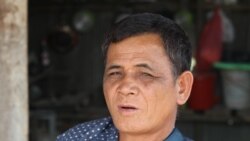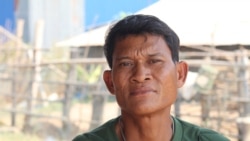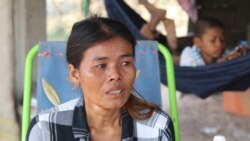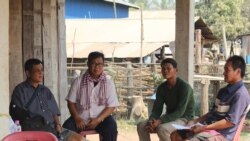Tuy Sros, 34, was one of the hundreds of people at a land protest in late December last year, in the northwestern border province of Banteay Meanchey. The dispute was similar to other land conflicts in the country; villagers had been displaced from land they were living on and the authorities claimed they were illegally occupying the land.
Most of the land disputants left the site of the protest, the provincial hall, after they were scattered away by military police personnel following two days of protests. But five protestors were arrested on the second day, December 28, and taken to the military police provincial office just next door.
Four days later, Tuy Sros was pronounced dead and officials were quickly putting forward claims that he had been sick before his arrest and that he was an alcoholic.
But two of the four people arrested with Tuy Sros told VOA Khmer they saw military police personnel beat up the farmer mercilessly, then continued to hit him later and refused to acknowledge his pleas for help or treatment.
Domestic and international human rights NGOs have long decried the frequent use of torture as an interrogation technique in Cambodia, which has led to custodial deaths, severe abuse, and beatings in police stations and prisons.
An Ruon, a rice farmer and one of the five arrested villagers, said he saw military police personnel kick Tuy Sros on his torso several times and that the beatings continued “day and night” for the four days they were in custody, mostly at the provincial military police office.
The 59-year-old villager said even the military police officials noticed that Tuy Sros was potentially showing signs of traumatic brain injury, with a “military police boss” allegedly asking his officials to continue the beatings and that he would manage the situation if Tuy Sros died.
“The guard said that he [Tuy Sros] shouted, made noises and ran awkwardly,” said An Ruon. “The boss said to beat him and beat him to death.”
The allegations against the military police and the alleged impunity mirror incidents reported in the past. Last year, Preah Vihear resident and Sum Moeun disappeared for two months after he was arrested in January 2019 and beaten severely. A photograph of Sum Moeun, following his arrest, appears to show his face swollen and bruised.
In 2017, three police officers from Kandal province were fired after severely beating two men during a traffic spat, leading to the death of one of the men.
Back in Banteay Meanchey, Him Kiri, 45, said he too was beaten repeatedly and was only sent to the local hospital after vomiting blood.
He said Tuy Sros seemed gripped with terror and “out of control” after the repeated beatings, exhibiting behaviors linked to severe trauma.
“He ran around awkwardly, looked through the door [of the cell], he was terrified, and shouted,” Him Kiri said.
This only resulted in another beating from the military police officials, Him Kiri said, adding that Tuy Sros then began crying out for his mother.
“He shouted for his mother to help and then was unconscious,” Him Kiri said. “He was unconscious three times. He was severely beaten on the stomach.”
All four villagers arrested with Tuy Sros maintained that he was beaten over and over again, even after officials noticed signs of severe trauma.
But, provincial authorities and military police were quick to release a statement on January 2, blaming the death on Tuy Sros’ alleged alcoholism and his deteriorating health prior to the arrest on December 28.
His wife, Buy Kimlak, said her husband did drink but was not an alcoholic, and that he had no pre-existing health problems. She added that it wasn’t hard to ascertain the cause of death with all the bruising on his body.
“When my husband left home, he was fine. His body is normally strong like others,” said Buy Kimlak, 35. “His dead body had several bruises and on his face, as well.”
Buy Kimlak is the mother of 14-year-old Sros Vorleak and earns an income by producing and selling charcoal, and buying poultry from local villagers to sell at the market.
Tuy Sros was part of a group of villagers that had occupied the contested land before they were informed that it was privately owned. They wanted provincial authorities to find them alternative land, which was rejected by local officials, leading to the heated protest.
Buy Kimlak said that they were first unaware the land belonged to a private owner and they only wanted an alternative piece of land to farm on.
“We are poor that is why I went to occupy the land,” she said.
Despite the contentious nature of land protests in Cambodia and the constant volley of accusations, there has been sustained outcry surrounding Tuy Sros’ death. Especially, given that the European Commission is expected to issues its final decision on whether to suspend trade privileges on account of Cambodia’s deteriorating human rights record.
The case, unusually, even garnered the attention of Prime Minister Hun Sen who on January 14 ordered an investigation into the death, adding that torture was unacceptable.
“If [the torture] is true, those who caused that death will be punished and can’t be forgiven,” Hun Sen said, during an annual gathering with Cambodian journalists.
“I already told people in the land dispute that they can’t be detained if they don’t violate any crimes,” he added.
Shortly after Hun Sen’s directive, two military policemen, Sar Bunsoeung, a deputy provincial military police chief and Choy Rathana, an officer working at a provincial anti-drug office, were arrested on January 18 and accused of torturing Tuy Sros.
They have been charged on two different articles of the Cambodian Penal Code and can face up to 15 years in prison on both counts.
Oum Reatrey, Banteay Meanchey provincial governor, and Ung Siphan, the provincial prison chief, could not be reached for comments.
Also, the four villagers detained in December have been released under court supervision, but still face the charge of violating private ownership in the land dispute.
Soeng Senkaruna, senior rights officer at human rights NGO Adhoc, urged the government and court to further investigate whether other officials were involved with the case.
“I think it clearly shows that there can be more people involved with this which can be the accomplice,” he said.
Back at Tuy Sros’ village in Ou Chrov district, Buy Kimlak is worried about financially sustaining her family. She said that she had received $3,000 for her husband’s funeral from various local officials, but it wasn’t clear who had pooled the money.
She said the money, despite its dubious origins, would not help with the heavy debt of $15,000 she had to repay, though now without the added income of Tuy Sros.
“I don’t have the ability to pay the debt. I asked for help with this,” she said.








